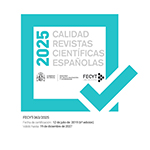Political maternities in Valerius Maximus and Plutarch. The Literary recourse to tradition
Abstract
This paper analyzes Valerius Maximus’ Factorum et dictorum memorabilium and Plutarch’s Lacaenarum apophthegmata to reflect on the way in which ‘political motherhood’ was conceived during the High Empire. From a careful and gender-based reading of both texts, we have attempted to reflect about how these authors intended to attribute to women a series of desirable behaviors in relation to their motherhood. Thus, many of their exempla explore the political action of these women on their children, but only in the case that it is exercised in the interest of the State. This approach, which has the advantage of making the maternal influence visible within the different stories, allows us to verify that the auctoritas of women over their children extended not only to their childhood and youth, but throughout all their lives. This paper, in summary, has tried to show how in the High Empire two authors from different backgrounds and chronology shared a series of ideals about the proper way of exercising the so-called ‘political motherhood’. We have made a cross-sectional and comparative analysis considering that, far from being opposed, Greek and Latin literature can complement each other.
Downloads
Article download
License
In order to support the global exchange of knowledge, the journal Investigaciones Feministas is allowing unrestricted access to its content as from its publication in this electronic edition, and as such it is an open-access journal. The originals published in this journal are the property of the Complutense University of Madrid and any reproduction thereof in full or in part must cite the source. All content is distributed under a Creative Commons Attribution 4.0 use and distribution licence (CC BY 4.0). This circumstance must be expressly stated in these terms where necessary. You can view the summary and the complete legal text of the licence.











